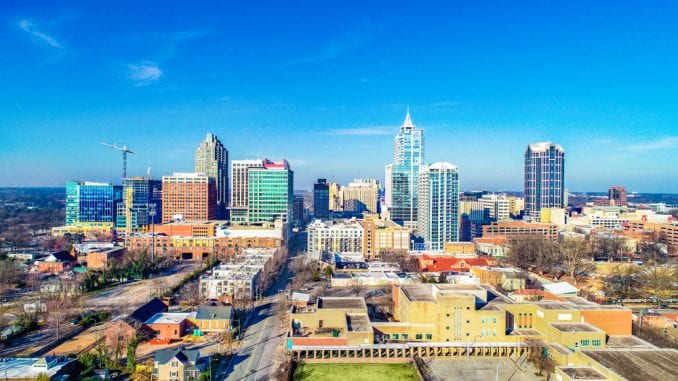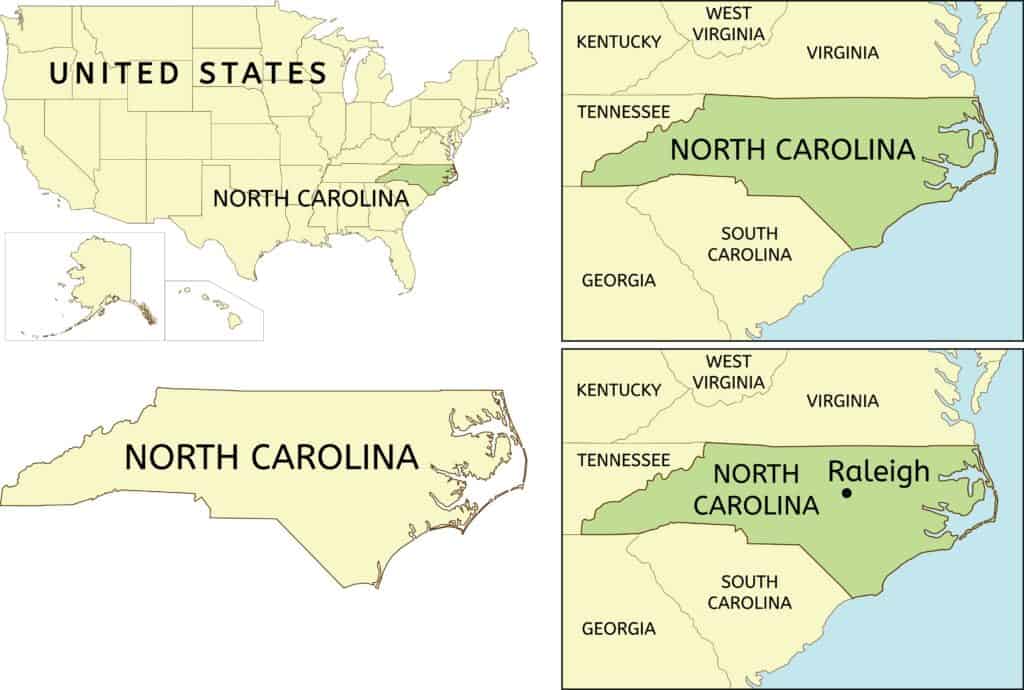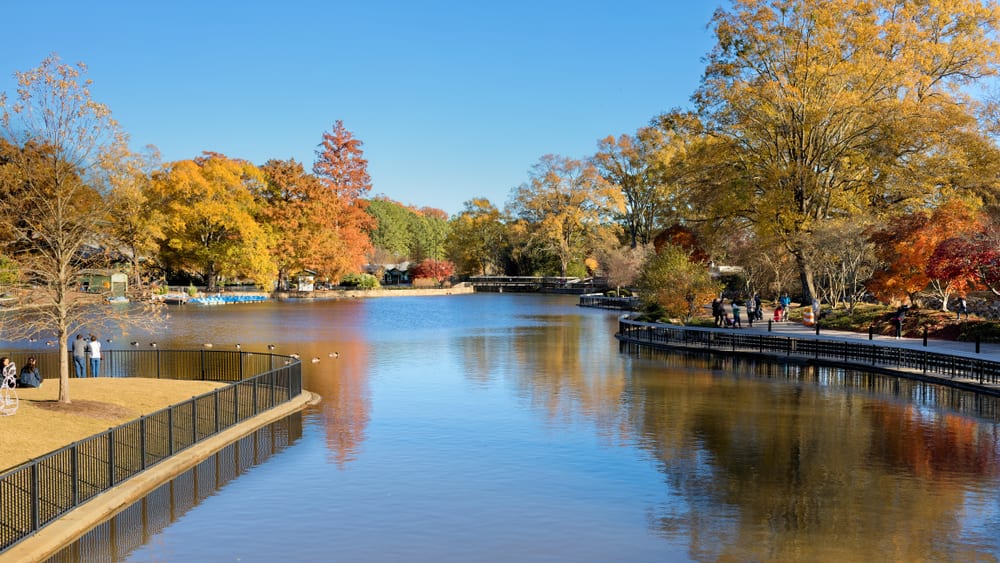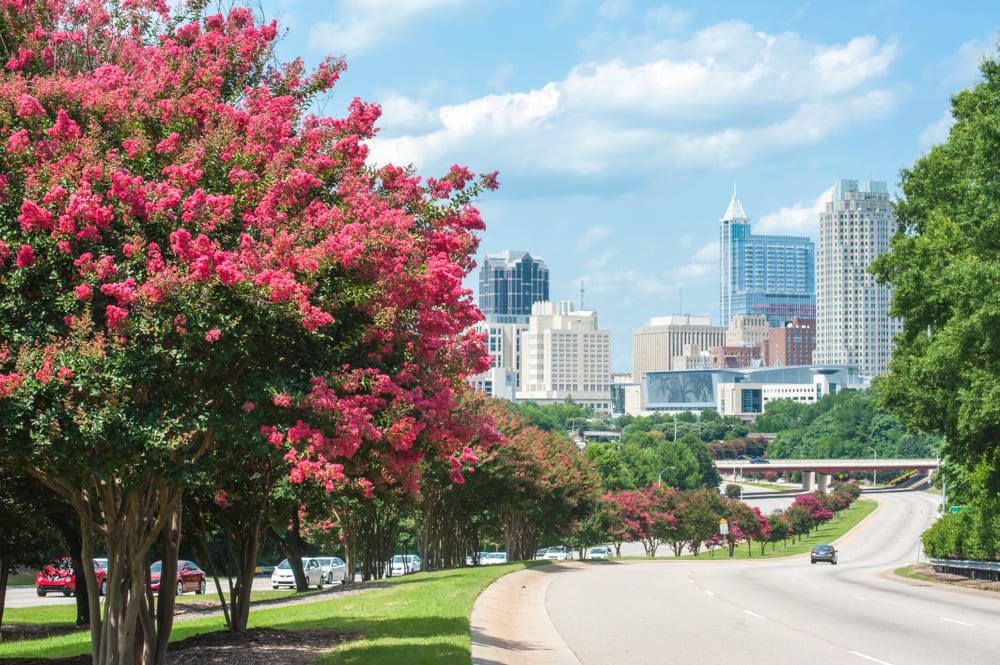
Wondering what the state capital of North Carolina is? Wondering how it came to be the state capital? We will answer everything that you need to know on this page!
Raleigh is the state capital of North Carolina, and it has been since 1792. Up until the establishment as the state’s capital, nothing existed on the land that Raleigh now sits upon.
Where Is The Capital of North Carolina Located?

As with many state capitals, Raleigh is centrally located. This was to help protect the state’s legislators in times of war, although one could argue that there is no longer any need for the state’s capitals to be centrally-located. Still, we can’t imagine that the location of any state capital will change now.
The city is located in the North Central part of the state. The Neuse River runs through it. The location was chosen for the ease of access to Virginia and South Carolina.
The closest major city to Raleigh is Durham, which is 63 miles away. Fayetteville is 131 miles away. You can get to Richmond in Virginia if you travel 155 miles.
Brief History Of Raleigh

Raleigh is an interesting city. This is because up until it was founded as a state capital, nothing existed on the site. There was no town. There was no city. It was just a vast expanse of land.
Why is this interesting? Well, almost all of the other state capitals were established locations. There were at least a few people living there. Not Raleigh, though. This meant that the area could be developed from the ground up with the intention of it serving as a state capital. This means that, even to this day, you can see elements of that planning in place.
The area quickly grew after the state’s legislature had its first meeting there in 1794, 2 years after it was established as a state capital. The area is perhaps best known for being the birthplace of future President, Andrew Johnson.
During the American Civil War, North Carolina was ceded from the Union. The city established defenses, although it was forced into poverty after the conclusion of the war. This meant that the city barely grew for decades.
Throughout the 19th and 20th Centuries, Raleigh expanded quickly. It became well known for its high quality of life, and the openness that the city had for businesses. In fact, even to this day, you will find that Raleigh is often listed as one of the best places to live in the United States.
When Did Raleigh Became The Capital of North Carolina?

Raleigh was established as the state capital in 1792. Before this point, there was a rotating system of state capitals. This helped to ensure that the British never knew where the state legislators would be. Although, because Raleigh did not exist as a place before its establishment as a state capital, it never filled that role before 1792.
Raleigh was decided upon after a lengthy decision-making process that started in 1788.
Why Is Raleigh The Capital of North Carolina?
There are a few stories floating around about how Raleigh became the capital of North Carolina. One even claims that Raleigh was chosen because it was close to a few legislator’s favorite bars. This is not true. There was likely no bar anywhere near Raleigh at the time. Plenty there today, though!
During the Revolutionary War, there was no set location for the state capital. To protect the legislators, the state capital would regularly rotate between various places.
Of course, having a rotating state capital is never a good idea. Certainly not back in the 1700s when you had to physically travel to see the legislators for your state. This meant that a better system needed to be established.
In the 1790s, the state legislators decided that a location had to be chosen to be the state capital. Fayetteville was the front runner, but for some baffling reason (at the time), Raleigh ended up becoming the state capital.
The reasons why Raleigh was selected soon became clear, though. The state had purchased a lot of land in the area. Raleigh was also ideally suited for links to South Carolina and Virginia. It also had links to major settlements throughout North Carolina. Not to mention the fact that the University of North Carolina was being established at the time, and this was incredibly close to Raleigh.
It took decades for people to accept Raleigh as the state capital. Even to this day, people are still not happy that Raleigh was chosen over one of the many other choices!
Best Places To Visit In Raleigh
There are plenty of great places to visit in Raleigh. Here are some of our favorites.
North Carolina Museum of Natural Sciences
Love dinosaurs? Love natural history? Love looking at small, live animals? Then this museum may be perfect for you. Plenty of exhibits can be enjoyed in this museum. It regularly ranks as one of the best places to visit in Raleigh, so it is absolutely worth checking out!
North Carolina Museum of Art
Raleigh is somewhat of a cultural hub. The North Carolina Museum of Art houses collections from some of the top Southern artists in the United States. There is artwork collected over a few centuries here, and every visit to the museum is a true joy.
Pullen Park
If you are interested in the history of North Carolina, then you need to take a trip to Pullen Park. Not only is the area incredibly beautiful, but this was the very first public park in the state’s capital.
Historic Yates Mill County Park
This will take you back in time. In the Historic Yates Mill County Park, you have 100 acres of open land to explore, and it is stunning. The centerpiece is an old 18th-century mill that has been lovingly restored to its former glory. Again, somewhere that you will likely want to explore if you are interested in the history of the area.
